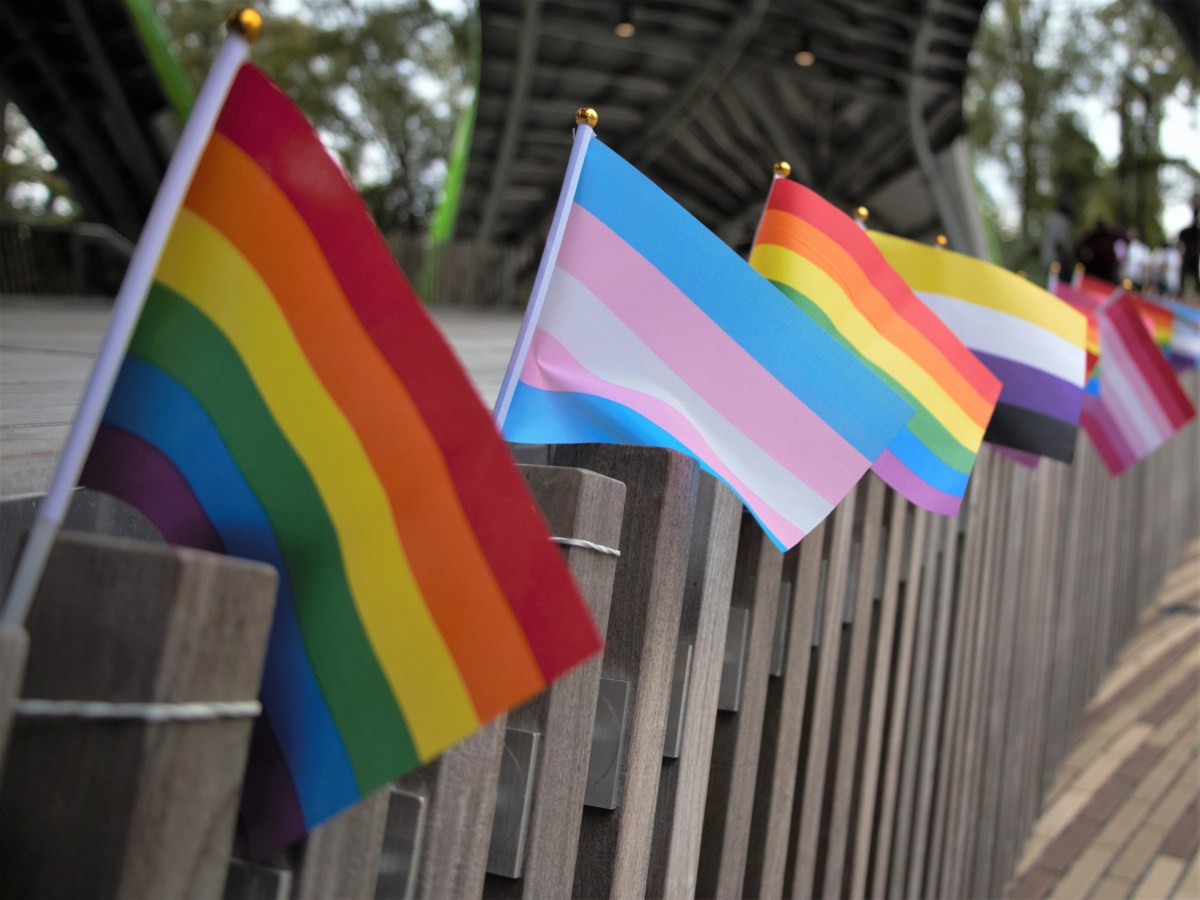Wheaton resident Ezra Towne leads a support group for transgender, nonbinary and gender nonconforming Montgomery County residents that discusses everything from finding queer friends to accessing gender-affirming medical care in the county. Twice a month, Maryland Trans*Unity members, who range in age from 18 to 78, gather virtually or in person to share resources and moral support.
Towne isn’t paid to do this and they aren’t a therapist or a medical professional. Towne says they care deeply about their community and points out there isn’t a central physical place for LGBTQ+ people to receive services and support in the county.
“The county is not doing enough,” Towne said. “There’s been no action. … I really desperately want there to be a space that is Metro accessible and [Americans with Disabilities Act] compliant … a place where we can make all things happen for LGBTQ organizations.”
Towne is one of several local advocates, including the nonprofit MoCo Pride Center and some councilmembers, asking the county to dedicate more funding for services benefiting the LGBTQ+ community. Despite several recent county government reports that found that the county needs to fund more services for LGBTQ+ residents, advocates are concerned that County Executive Marc Elrich’s proposed $7.1 billion operating budget does not contain allocations specifically or obviously aimed at the LGBTQ+ community.
The exception is a $500,000 proposal toward creation of a Sexual and Gender Minorities Health Center that Elrich proposed when introducing his budget in March.
Elrich proposed in March that the $500,000 would come from $33 million reimbursement from the Federal Emergency Management Agency for COVID-19 expenditures the county was hoping/expecting to receive. The county has since received the money, but advocates are concerned the allocation isn’t enough.
In an April 24 press briefing, Elrich defended the amount of funding for LGBTQ+ services in the budget.
“I hope the council passes the amendment … there are other projects in [the budget] that we know have real serious importance to the community,” Elrich said. “Given that this is a budget that required no tax increase and is fully funded and that the county has record levels of reserves, we don’t see justification for taking the position that there’s some desperate need to not do these programs.”
The creation of the proposed center is a recommended outcome of a county Office of Legislative Oversight report that found stark disparities in health care access, and specifically gender-affirming care, for trans county residents.
The report, which said the county needed to be doing more to address transgender health care disparities, specifically recommends that the council address the feasibility of creating a LGBTQ+ community center in the county, which could provide resources to residents including health care services, mental health services, support groups, meeting and recreation spaces, youth-specific services, legal services, employment support and housing services.
Another LGBTQ+ community survey released to the public by the county government in October 2023 received strong support for a LGBTQ+ focused center or community space from respondents.
A proposed special appropriation to the budget and Capital Improvement Program (CIP) would provide $500,000 to help start a new clinic in downtown Silver Spring that will be run by privately-run CCI Health Services that will offer sexual health services and gender-affirming treatment. Because it will be part of the CIP reconciliation conversations, as several county projects compete for funding, it does not yet have final approval.
“We need a more synergistic strategy to address the underlying issues identified in the report. That’s something that we’re committed to working on over the summer,” Earl Stoddard, director of the Montgomery County Office of Emergency Management & Homeland Security, said during Elrich’s April 24 media briefing. “We’ve had conversations, ranging from having an LGBTQ health initiative like we do our ethnic health initiatives, but we want to figure out what the best strategy is for the community to address the underlying needs.”
County Council Vice President Kate Stewart (D-Dist. 4) and councilmembers Kristin Mink (D-Dist. 5), Evan Glass (D-At-large) and Marilyn Balcombe (D-Dist. 2) wrote a letter April 18 to the council Health and Human Services Committee, urging them to allocate an additional $500,000 in the fiscal year 2025 to the MoCo Pride Center.
The MoCo Pride Center is an organization that promotes health, well-being and social events for the local LGBTQ+ community. The organization does not have a physical building.
“The only funding the MoCo Pride Center has received up to this point from the county government has been through their contracts every year with the Department of Health and Human Services to put on Pride in the Plaza every June,” the letter says. “As we approach this fourth annual event, it is imperative that we recognize the key role the MoCo Pride Center plays in serving our county’s LGBTQIA+ community, especially the [Black, indigenous and people of color] community year round.”
Councilmembers Gabe Albornoz (D-At-large), Laurie-Anne Sayles (D-At-large) and Dawn Luedtke (D-Dist. 7) all serve on the Health and Human Services Committee.
The letter notes that MoCo Pride Center has partnered with the county government as well as other organizations on work to combat issues ranging from opioid overdoses and addressing hate and bias incidents to providing food and housing insecurity resources and inclusive multilingual family literacy programs.
“We are a linkage-to-care organization that focuses on those who are most underserved and marginalized in our community,” MoCo Pride Center CEO Phillip Alexander Downie told MoCo360.
Downie said the MoCo Pride Center’s work ranges from setting up HIV testing clinics and helping connect residents with gender-affirming care resources to hosting social events such as the annual Pride in the Plaza festival in Silver Spring. Downie said the organization doesn’t solely serve the LGBTQ+ community–anyone seeking services will receive support—and that the organization frequently works with the homeless population and people who were recently incarcerated, regardless of their sexual orientation or gender identity.
“We want to ensure that we can provide these programs and provide these spaces so that people have a place to go and receive resources in a nonjudgmental way,” Downie said.
The county has relied on the MoCo Pride Center for much of its HIV and sexually transmitted infection testing services, according to council documents. The organization provided more than 250 HIV tests at Pride Month events in May and June 2023, according to county data.
The Baltimore Banner reported Wednesday that cuts have been made to HIV testing and services in the Maryland state budget. It’s unclear how or if that decision will affect Montgomery County.
Stewart said she partnered with her council colleagues on the letter because the MoCo Pride Center provides services to the LGBTQ+ community that the county government needs to support.
“As we’re looking at everything that’s going on in our country right now, we need to ensure we have providers and easy access to care … it’s fundamental to what we need to be doing in our community,” she said.
Mink shared a similar sentiment in an interview with MoCo360. She said she is concerned that the county government is too reliant on community organizations to provide services and resources that the county refers residents to.
“We’re putting a financial burden even on people who are doing the important work that the council loves to tout, and we all go and take photos for social media. But we have not funded that work in a sustainable way,” Mink said.
Around a dozen LGBTQ+ advocates gathered at the County Council meeting on April 16 to urge councilmembers to approve a $200,000 appropriation for the MoCo Pride Center for the current fiscal year, which ends July 1. Downie said the organization is facing increased demand for services, as it has been “bridging the gap to provide basic necessities” for LGBTQ+ county residents.
“This is a real and present emergency. Threats of violence [toward the LGBTQ+ community] persist and are extreme,” Downie testified to the council during the April 16 meeting.
Lee Blinder, founder and director of Trans Maryland, an organization that advocates for the trans community and helps connect trans Marylanders with resources, shared experiences similar to Towne’s of providing unpaid support to the county’s LGBTQ+ community.
“I’ve often been the first call that people make in Montgomery County when a young person who is transgender or queer is kicked out of their house,” Blinder testified to the council. “I’m not paid by the county to be a 24/7 youth crisis housing responder. However, it is part of my uncompensated duties because I’m very dedicated to our young trans and queer people.”
In interviews over the course of 2023, multiple trans county residents and advocates told MoCo360 that it was extremely difficult to access gender-affirming care within the county. Several residents reported traveling to Washington, D.C., or Howard County to access appropriate care.
“I can’t really give medical advice because I’m not a medical professional,” Towne told MoCo360 in an interview. “But so many people come to Trans*Unity looking for that, and they don’t know where to start. I wish there were more resources.”
Downie said he’s hopeful that the county government will show more financial support for the LGBTQ+ community, but he’ll have to “wait and see.” He said he worries that the most marginalized county residents aren’t always able to testify in support of these appropriations because of jobs, transportation access and other responsibilities.
“People also need to realize that those who are most affected by the problem don’t have the agency to come and just show up to all the government political forums,” Downie said. “It takes agency and privilege to be able to show up in a space for free and to advocate for yourself and your community.”
The council must vote on a final fiscal year 2025 county budget by June 1. The new fiscal year starts July 1.



